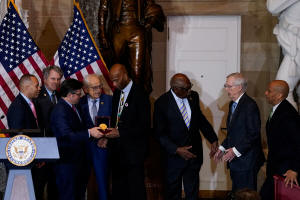|
Hall-of-Famer Doby, who died in 2003, was
posthumously awarded the medal by congressional leaders during a
ceremony at the U.S. Capitol in Washington, held on what would
have been his 100th birthday.
The baseball star's son, Larry Doby Jr., accepted the medal on
his father's behalf.
"This means the world to my family," the younger Doby said in
brief remarks. "He would be extremely proud and humbled by
this."
Doby, a star in the Negro Leagues who had served in the U.S.
Navy during World War Two, followed Dodgers second baseman
Jackie Robinson into baseball's major leagues by three months
and endured much of the same ill treatment.
As the first Black player in baseball's American League, he
overcame those difficulties to star for the Indians and later
for the Chicago White Sox.
In 1948, he became the first Black baseball player to hit a home
run in a World Series game during a championship year for the
Indians. After retiring as a player he coached in the major
leagues, becoming baseball's second Black manager when he was
hired for the job by the White Sox in 1978.
"American culture remembers Jackie Robinson, as we've heard here
today, but we're ensuring that America also remembers Larry's
contributions to sport and society," Republican House Speaker
Mike Johnson said during the ceremony.
"Up until Larry took the field for the Indians in 1947, the
existence of Black athletes in sports was regarded as an
experiment," Johnson said. "His ascent to the major leagues was
an affirmation that not only do they belong, they make the game
much better."
(Reporting by Dan Whitcomb in Los Angeles; Editing by Matthew
Lewis)
[© 2023 Thomson Reuters. All rights
reserved.]
This material may not be published,
broadcast, rewritten or redistributed.
Thompson Reuters is solely responsible for this content. |
|





